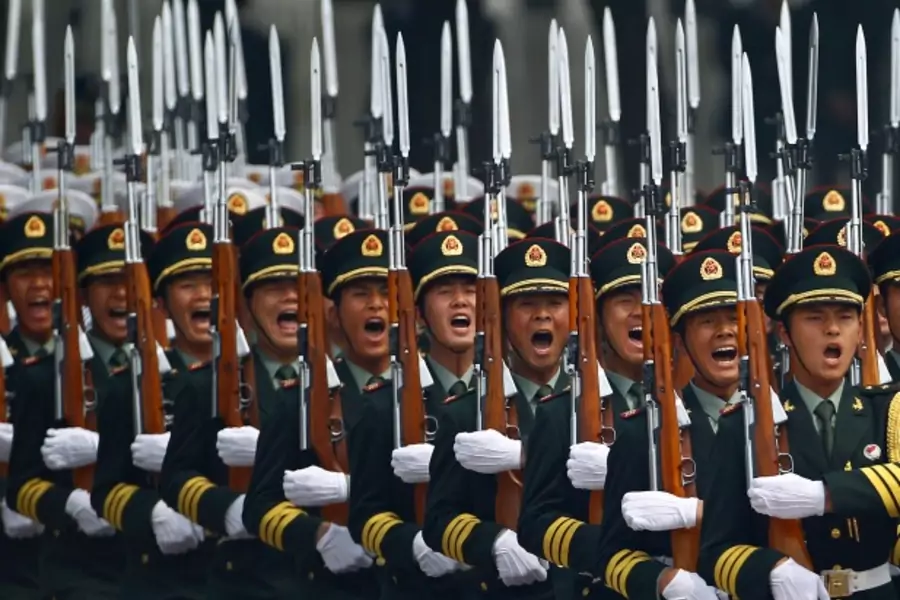Robert S. Spalding III: Being Firm With China

More on:
Robert S. Spalding III is a military fellow at the Council on Foreign Relations.
The Air Defense Identification Zone recently announced by the Chinese was most likely not hastily done. The Chinese do not do anything hastily. It is part of a return to preeminence for a nation that feels slighted by history. Assailed on all sides by invaders and conquerors, China has had to bide its time while it rebuilt its devastated economy. While still a work in progress, Beijing now feels sufficiently confident about the future to assert its military rise. It’s important to remember, however, when it comes to its military rise, China is not evil, nor is China good. China is merely pursuing its own national interests.
How the United States pursues its interests as China develops as a military power will determine how world politics works in the future. The United States should pursue a policy that seeks to ensure the peaceful rise of China within the context of the current political and economic world system. It should do this not because it benefits the United States, but rather because it benefits the world. While different in aim from Chinese pursuits, it is consistent with the values that guided such grand visions as the League of Nations, the United Nations, and the Bretton Woods system.
The current economic and political world system was founded on the idea that great power politics need not lead to suffering on the scale of World Wars I and II. Instead, nations could pursue their interests in a framework that allowed for the peaceful settlement of differences. While war has not ceased, casualties as a result of war have diminished over ten-fold from the days when power politics were the norm. More importantly, China has benefitted from this system.
What does China want? This is difficult to know for certain, but a good bet is to look at the status quo during the Qing dynasty when China was a regional power. What was their relationship with other nations like? First, China built the biggest wall in history to keep the northern barbarians out. Today, that means China wants the West to stay out of the Middle Kingdom’s affairs.
Second, Imperial China did not claim sovereignty over other Asian countries, but instead exercised a “vaguely defined suzerainty, which was essentially a variety of feudal overlordship.”[i] These Asian vassal states included, “Korea, Vietnam, Burma, Siam, Cambodia, the Malay Peninsula, and even the Sulu Archipelago (today part of the Philippines, between Mindanao and Borneo).” Their representatives to the Chinese court performed the kowtow, which “was a symbolic recognition that their countries were humble vassal states of the mighty [Chinese] empire.” Meaning—Asian nations should obey Chinese edicts and should not challenge China’s power.
While returning to the Imperial China status quo seems unlikely in the current world order, China has been gradually growing in military power in Asia. The Senkaku/Diaoyu Islands dispute represents only one of the many territorial claims that China has pursued militarily with former vassal states. While a Chinese territorial claim can be made on the basis of history, it is equivalent to discounting the current world order that has allowed China to become an economic powerhouse.
Recent precedent under the current economic and political system suggests that Japanese territorial claims are valid. In 1953, the 1951 Treaty of Peace with Japan placed the Senkaku Islands under the administration of the United States as part of Okinawa. In 1972, the United States relinquished rights and interests to Japan under Article III of the Treaty of Peace with Japan in the Okinawa Reversion Agreement. Imperial Chinese maps may show Diaoyu Islands as a Chinese territory, but militarily enforcing the claim represents a unilateral attempt to upset the status quo political and economic system that has energized China’s recent economic and military revival.
By challenging China’s attempt to pursue its interests in a manner that does not conform to the current political and economic world system, the United States will find itself vilified in Chinese press, because that is one element of national power. It may find itself faced with unsavory economic impacts, for that is another. It may even face military pressure or diplomatic hostility. Yet to fail to be firm with China carries the risk of a return to a world of great power politics. Indeed, China would do well to learn a recent lesson from U.S. forays into the military abyss. Meaning—in the end, China will find staying with the current status quo eminently cheaper.
The views expressed are those of the author and do not reflect the policies or positions of the U.S. government or Department of Defense.
[i] David Curtis Wright, The History of China (Westport, CT: Greenwood Press, 2001), 93, http://www.questia.com/read/101005773
More on:
 Online Store
Online Store